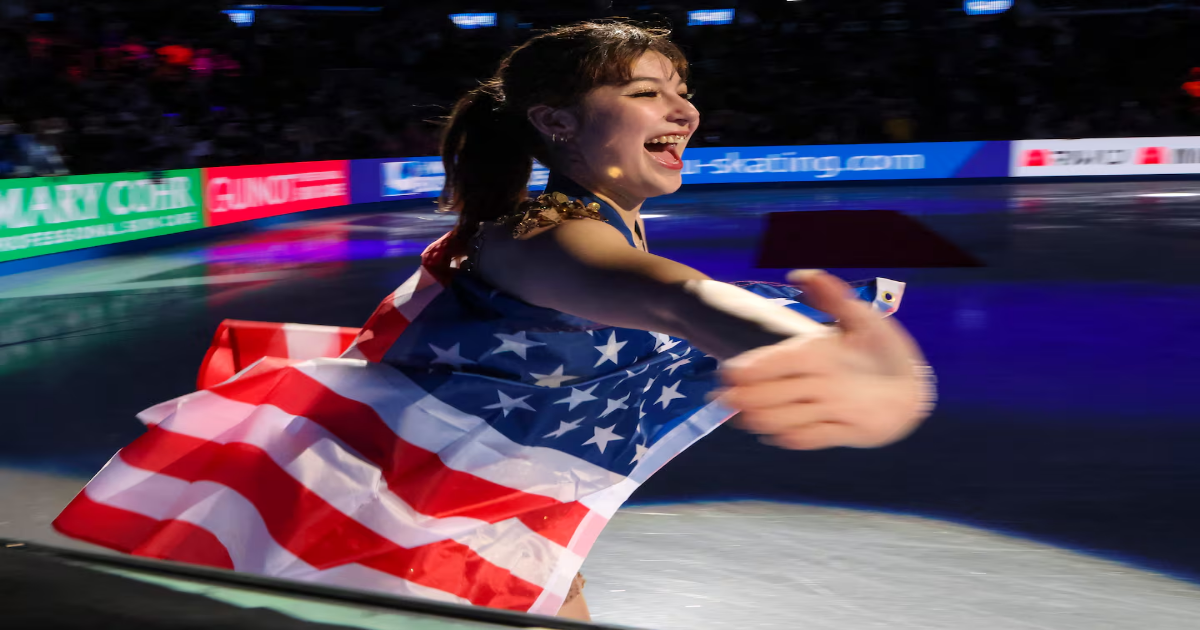So Liu’s reverberating victory Friday night was more significant, especially because she dethroned Japan’s Kaori Sakamoto, the three-time defending champion and, until this week, the decided favorite to win the Milan Olympics.
“Even yesterday I didn’t expect this,” said Liu, who’s coming off a two-year retirement and didn’t win the January nationals. “I didn’t have expectations coming in. I never have expectations coming into competitions any more.”
Her teammates had been iffy about their own chances. Amber Glenn, the US champion, had been facing mental health issues this season.
“I’ve also been dealing with a lot of grief and loss recently,” she said after pulling herself up from ninth to fifth. “So I’ve had a tough time.”
Isabeau Levito, last year’s world silver medalist, missed nationals with an injured foot and had to petition her way onto the team.
“I didn’t think I was going to be strong enough physically or that my training had fully prepared me,” she said after placing fourth. “But my coaches were right when they said I was ready for the competition.”
So when the three of them finished in the top five, it was cause for jubilation. “Go Team USA!” Liu exulted.
Would the results have differed had the Russians been in the mix? Possibly. The Motherland had won five titles and three Olympic gold medals in less than a decade before being banned from the last four global championships after the invasion of Ukraine.
The truth is that nobody knows how good the Russians are these days. But they’ll never again be as dominant as they were when they could use (and abuse) 15-year-olds like Alina Zagitova and Kamila Valieva.
The minimum age now is 17. And after the doping scandal involving Valieva at the Beijing Olympics the Russian program — and particularly coach/martinet Eteri Tutberidze — are under an unrelenting spotlight.
Only one Russian woman will be allowed to compete in Milan as an “individual neutral athlete.” Odds are that it’ll be Adeliia Petrosian, the 17-year-old who has won the last two national titles.
But Petrosian, like the rest of her countrywomen, never has competed internationally as a senior. Whoever the Russian federation chooses will have to qualify at the last-chance event in September in Beijing. And if she gets injured before the Games, the Russians can’t replace her.
So for the first time since 2002, when Michelle Kwan was reigning world champ, an American woman will be favored going into the Games.
Liu earned that designation with a exceptional free skate that upstaged Sakamoto, who’d submitted a brilliant effort of her own, a saucy, jazzy routine to the “Chicago” soundtrack that delighted the crowd.
Then she had to sit in the new “leader’s chair,” hoping that none of the final four skaters would displace her.
“I was emotional, I was crying,” said Sakamoto, who was bidding to become the first woman to win four titles in a row since US skater Carol Heiss in 1960. “I cried again. And I was feeling a bit frustrated: I wish it was me. Then I started crying again. There was just a lot of emotions piling up inside of me.”
The only consolation was that Sakamoto shed the burden of being the Olympic favorite.
“I did feel a weight off my shoulders,” she said. “This is an important experience, to feel this crushing defeat, because now I can be an underdog, a challenger going forward, aiming for the top.”
The United States hasn’t won an Olympic gold since Sarah Hughes and Kwan went 1-3 in Salt Lake City in 2002. It will have a chance for two medals again in Italy.
What the Americans have now is a legitimate pipeline just as they did in 2002 with Kwan, Hughes, Sasha Cohen, Newton native Jenny Kirk and Angela Nikodinov.
The competition for the Milan team will be the toughest in a couple of decades. In addition to Liu, Levito, and Glenn, there’ll be a couple of teenagers in the chase.
Sarah Everhardt was the alternate here and Elyce Lin-Gracey was the bronze medalist at this month’s World Junior Championships. In the queue for the 2030 Games is Sophie Joline von Felten, the 15-year-old from the Skating Club of Boston who’s the national junior champion.
You don’t win the Olympics without a pipeline. The Russians had one and so do the Japanese, who finished third (Mone Chiba) and sixth (Wakaba Higuchi). Their best skater isn’t even here. Mao Shimada, who’s too young at 16, already has claimed three World Junior crowns.
Liu won two US titles before she was old enough to compete at a world championships. She’s still only 19. Winning here was a deferred dream realized.
“It means so much to me because of everything I’ve been through,” she said. “My last skating experience, my time away, and this time around.”
John Powers can be reached at john.powers@globe.com.



